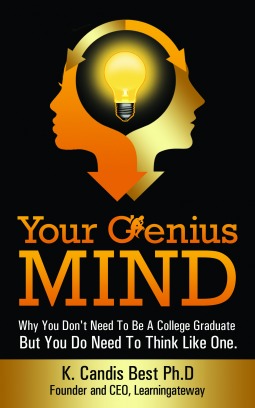There a people who will argue passionately about the value of a college degree and then there are those who will discount it citing successful people who did just fine without a degree. What is important to understand is that only a few college dropouts become ‘Steve Jobs’ of this world, while a healthy percentage never even reach the median income bracket. What people who triumphantly cite these examples choose to ignore is the percentage of college graduates who succeed compared to the dropout who do well in life.
In Your Genius Mind, Dr K. Candis Best argues the need for a college degree, but stresses that a university is a place to get an education and not just a job. The author is an advocate of higher education and staunchly believes that there is a genius in all. She currently serves as an Associate Professor and the Brooklyn campus chairperson for the departments of Human Services and General Studies at St. Joseph’s College. She resides in the Fort Greene section of Brooklyn, New York.
Your Genius Mind
Author: Dr. K Candis. Best
Pages: 198 pages
Publisher: Caroline Street Publishing, LLC (August 8, 2014)
ISBN-10: 0990398218
Book Review
Dr. K. Candis Best begins the first chapter making it loud and clear that “college was never intended to get its graduates a job.” This is exactly the thing that every student stepping into a college or choosing a career needs to know.
The book is written in a conversational style and the author motivates the reader by familiarizing the confused young minds with the journey ahead. The first chapter, Your GENIUS Journey, focuses on peeling away everything an average student hears all his life: you don’t have an academic bend – college isn’t for you! She points out there are only a few who never had to exert in school. But for most, nothing is impossible, some need an hour while others need three to perfect the same. It is up to you if you are willing to put in the ‘three’ in your life or settle for mediocrity with putting less.
The author uses GENIUS as an acronym for pointing out qualities of an educated mind: Generative, Extraordinary, Need-fulfilling, Intentional, Unique, and Service-oriented. She elaborates on each of these in detail in the rest of the chapters.
In Postcards and Pit Stops, the author provides additional resources for college bound students to help them make the most of their time at a university. Just as What Color is Your Parachute helps you discover what you are best at, this book will help students understand what they should be looking for during their time at a university. As much as this book is for students, I believe it is also for their parents, who need to put college education in the right light and help their wards make the best of time and money they are investing.
